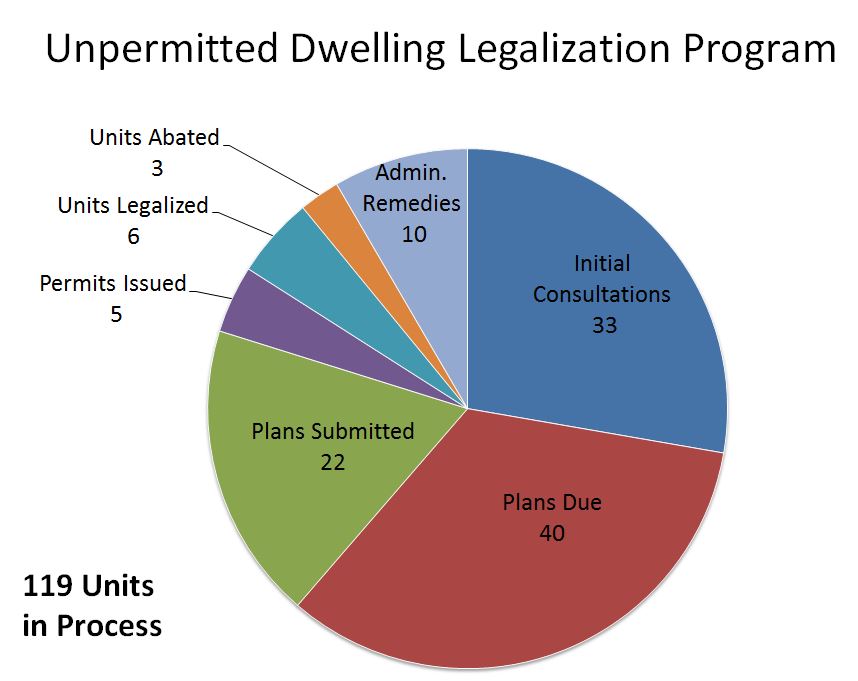Accessory Dwelling Units (ADUs) Legalization
How to Legalize Your ADU
- Contact Us.
Have questions about legalizing your unit? Email the property address to Nancy Concepcion or call Nancy at (831) 420-5112 to review your property, the legalization process, and typical timeframe. A meeting can be scheduled to review any documentation you have. It is recommended that you obtain a copy of the "Residential Building Records" at the County Assessor's office at 701 Ocean Street prior to the meeting (see Legalization Documents for form).
- Site Inspections - Optional. Only for units built before January 1, 2020 and 5 Year Code Delay requested. Complete Checklist.
In the Notice of Corrections/ Determination Notice/ Notice of Violation of an Unpermitted Dwelling Unit, and if the unpermitted accessory dwelling unit was built before January 1, 2020, per State Law, you may apply for a five year stay of enforcement. The Property Owner is required to complete the Checklist and pay fees for an Inspection (range $75 - $250 per inspection). There may be supplemental reports required to be prepared by a structural engineer, a licensed plumber, or an electrician to verify the unpermitted unit's safety. Also, evidence to confirm facts and substantiate statement of an item on the checklist may be required.
Note: In cases where it is determined that there is a health and safety concern, the stay will not be granted.
- Plan Submittal and Fees.
You will need to find a design professional to prepare plans. Plan specifications and submittal details are on the Building and Safety webpage under Applying for a Building Permit. A yearly inspection is required while going through the process to legalize the unit to verify there are no discernable health and safety concerns. Note: This yearly inspection does not legalize the unpermitted unit; only plans and final of a building permit will. In general, the legalization of the unpermitted unit is typically completed within a year of the submittal.
- Inspections.
Once your building permit has been issued, timely inspections will be expected. Compliance Assessments will be done. Note: The City of Santa Cruz has the ability to issue and charge for Compliance Assessment for an unpermitted unit.

How Recent Changes to ADU State Law and Local Standards Make Legalization Possible
The following recent changes to state ADU law may help to facilitate the legalization of your ADU:
Government Code Section 66332 (amended by AB 2533 (2024))
- For any unpermitted ADU or JADU constructed prior to January 1, 2020, a local jurisdiction can deny a building permit to legalize the unit only if it is deemed substandard pursuant to is deemed substandard pursuant to Section 17920.3 of the Health and Safety Code. A local jurisdiction cannot deny a building permit to legalize the unit for noncompliance with building code or state or local ADU development standards.
- Before submitting an application for a permit, the homeowner may obtain a confidential third-party code inspection from a licensed contractor to determine the unit's existing condition or potential scope of building improvements before submitting an application for a permit.
- An applicant for a permit to legalize an ADU or JADU constructed prior to 2020 is not required to pay impact fees or connection or capacity charges except when utility infrastructure is required to comply with Section 17920.3 of the Health and Safety Code and when the fee is otherwise authorized by state ADU law.
Government Code 66331
For any unpermitted ADU constructed prior to January 1, 2020, a property owner can request a delay of enforcement for five years to allow the owner to correct the violation, so long as the violation is not a health and safety issue, as determined by the enforcement agency (Gov. Code, § 66331; HSC, § 17980.12).
Health and Safety Code Section 17958.12 (added by SB 1226 (2018))
An unpermitted ADU can be permitted based on the building code that was in effect at the time the unit was determined to have been constructed.
Local code changes
In addition, over the last several years, the City has made changes to our ADU Ordinance (24.16), addressing many items that prevented people from legalizing their ADUs. Reduced costs, streamlined permitting, and changes to things like parking requirements, setbacks, building heights, lot size, and whether the property is owner-occupied have eliminated many barriers to legalization.
Obtaining Copies of Your Records
In preparation for meeting with us about your ADU, there are two places you can obtain records about your property.
Contact Information
Have questions about legalizing your ADU or if your ADU is legal?
Have questions about building codes and what applies to your existing or new ADU or permit?
General questions and information about ADUs:
Legalization Documents
Stay of Enforcement